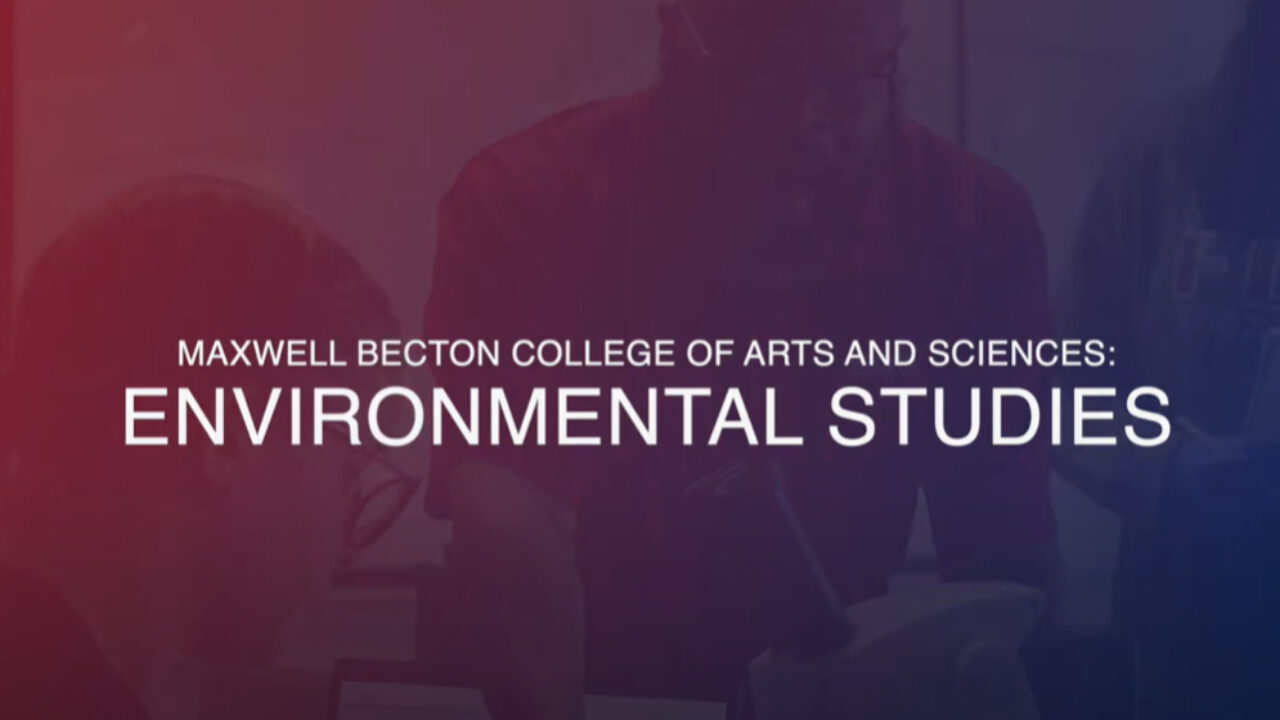Environmental Studies BA

Admissions Planning Message
This program is not open for new enrollment. For more information see this announcement. Students may wish to consider a degree with several newly created concentrations in the Social Sciences. You may also wish to browse through the program finder.
The Environmental Studies BA is based on a commitment to educating students and future global citizens about the complex intersections of the Earth’s physical and biological processes with its myriad social and political systems. The twenty-first century is replete with complex environmental challenges, and building a sustainable future is an interdisciplinary project requiring structural changes and political organizing built on sound scientific evidence. FDU’s Environmental Studies major ensures that our graduates are active participants in this global problem-solving endeavor.
FDU graduates with a BA in Environmental Studies will be able to:
- Demonstrate knowledge and understanding of the major concepts in environmental studies and important connections and tensions at the intersection of the social and natural sciences.
- Identify, retrieve, understand, and critically scrutinize relevant issues within the environmental studies literature—including scholarship in the sciences, social sciences, and humanities—and apply this understanding to novel problems and contexts.
- Demonstrate proficiency in communicating environmental studies concepts both verbally and in writing.
- Demonstrate knowledge of fundamental and current scientific and visualization techniques as applied in environmental studies.
- Apply the scientific method to generate hypotheses, collect data, design and conduct experiments, and analyze a broad range of environmental data.
- Develop and effectively use the critical thinking skills necessary to debate, deliberate, and challenge local, regional, national, and global climate policies and practices.

The Environmental Studies curriculum is designed to be flexible. It will provide every graduate the opportunity to build a strong common foundation across three disciplinary approaches: the sciences, the social sciences and humanities, and business. After building that base, students are encouraged to chart their own path through our course offerings. This adaptable structure accommodates students who want to work in a conservation lab just as easily as it meets the needs of those who want to do environmental policy work, work on community resource mapping, or focus on green technology development. Students who follow these diverse threads come back together in their senior year to work together on a capstone project.
Internships and Fieldwork
Taking advantage of the myriad professional and scholarly opportunities in New Jersey and the greater New York City metropolitan region, students graduating with a degree in Environmental Studies must compete either an approved internship or fieldwork/research apprenticeship. Given the growing centrality of climate-related issues in governance and business, these internship/fieldwork requirements will help students make vital connections and market themselves in a tight and competitive labor market.
Florham Campus
Major Requirements (40-49 credits) (2.0 GPA Required)
Required Courses (16 Credits)
- BIOL1070/BIOL1071 Ecosystems & Environmental Sci. (4)
- BIOL1180 Climate Change Biology (3)
- GEOG2700 Environmental Geography (3)
- MGMT3400 Management & Sustainability in Global Context
- GEOG3001 Introduction to Geographic Info Systems (3)
Major Elective Courses (18-24 credits)
- Environmental Sciences (2 courses – one with lab, 6-8 credits)
- Culture and Humanities (3-6 credits)
- Social Sciences & Policy (3-6 credits)
- Methods Course (3 credits)
Upper-Level Requirements (6-9 credits)
- ENVS3000 Fieldwork-based Research Assistantship (3)
- ENVS3999 Environmental Studies Internship (0-3)
- ENVS4001 Senior Research Seminar (3)
A minimum of 120 credits is required for graduation. Six credits from the minor may be applied toward the General Education requirements.
Metropolitan Campus
Major Requirements (40-49 credits)
Required Major Courses (16 credits)
- BIOL1105/1115 The Human Environment (3) or
- ENVR1001/1002 Intro to Environmental Sci, (3) or
- BIOL4400 Selected Studies in the Environment (3)
- ENVR2111/ENVR2112 Oceanography (4)
- GEOG2700 Environmental Geography (3)
- MGMT3400 Mgmt. & Sustain. In the Environment (3)
- GEOG3001 Introduction to Geographic Info Systems (3)
Major Elective Courses (18-24 credits)
- Environmental Sciences (2 courses – one with lab, 6-8 credits)
- Culture and Humanities (3-6 credits)
- Social Sciences & Policy (3-6 credits)
- Methods Course (3 credits)
Upper-Level Requirements (6-9 credits)
- ENVS3000 Fieldwork-based Research Assistantship (3)
- ENVS3999 Environmental Studies Internship (0-3)
- ENVS4001 Senior Research Seminar (3)
A minimum of 120 credits is required for graduation. Six credits from the minor may be applied toward the General Education requirements.
Career Outcomes
Graduates with a degree in Environmental Studies from FDU will be well-placed for professional futures employment in the following fields:
- Consultancies
- Data Analysis
- Education
- Environmental Think Tanks
- Green Technology Companies
- Journalism
- Legal and Policy Research
- Lobbying and Advocacy
- Management
- Natural Resources and Environmental Conservation
- Private Research Laboratories